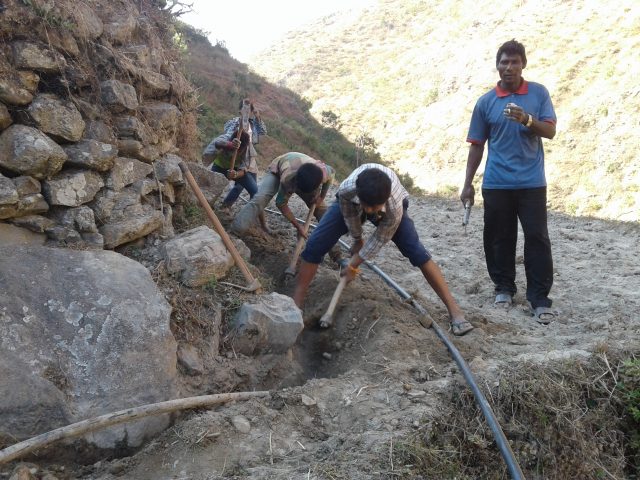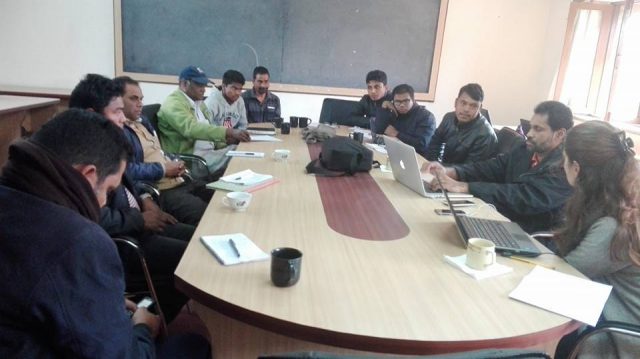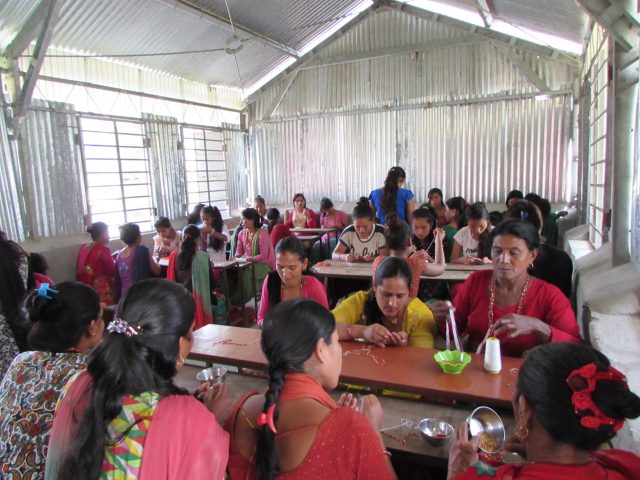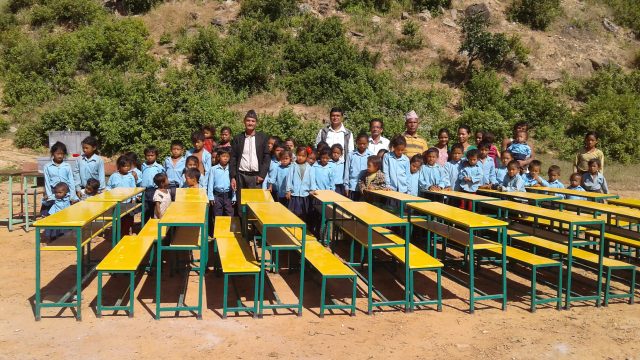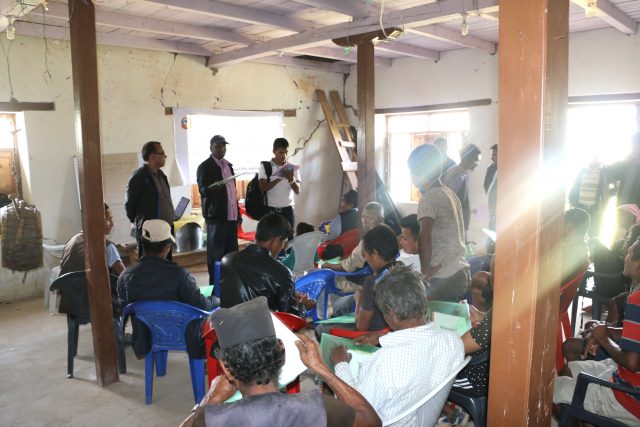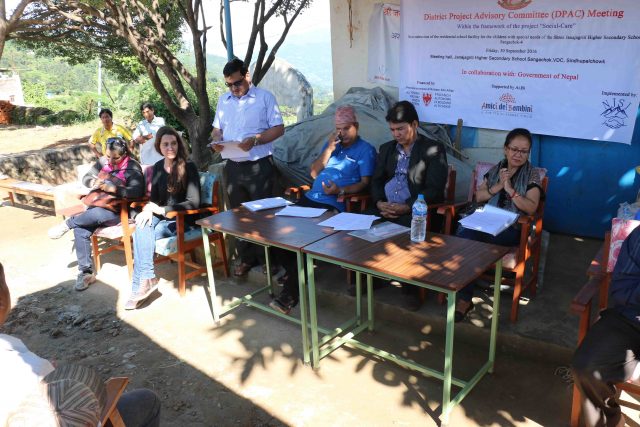People in Chapadi village of Rakathum VDC are grappling with shortage of drinking water as the water sources dried after the 25th April earthquake. Nepal Jesuit Social Institution, had made an assessment to fix 5 Km water pipe line in the month of June 2016. The work could not continue as the pipe line was going through the fields. As the harvesting season is over NJSI has continued a project of fixing 5 km water pipeline for the Chapadi village in Ramechhap district on 5 Dec, 2016. Now very soon the people have water in the village.
Review meeting at HRDRC
On 23 November, NJSI staff gathered at the the HRD Research Centre in Sanepa, Kathmandu to have an evaluation of the various activities done by NJSI during the year of 2016. The meeting honoured the presence of Ms. Cristina Fernández Durán (Program Manager, Xavier Network, Madrid, Spain) who was with us for a weeklong visit to NJSI.
The meeting started with the presentation of the status report from all the 11 districts, where NJSI activities are being carried out. The team was happy to note that even with all the constraints of political, bureaucratic, and natural difficulties, NJSI has created tremendous impact on the earthquake affected areas and brought out qualitative changes in the lives of many people, mainly women and children. It was obvious that the motto ” Reaching the Unreached” was kept as a check point before making any decisions taken with regard to NJSI’s earthquake intervention. The output of reaching out to 88 schools, more than Twenty thousand students, and about 6000 households all in remote places during the emergency phase and building semi- permanent and permanent structures in 45 schools, the ongoing work of building 6 hostels for special children in the reconstruction phase point to the effective activities of NJSI.
The meeting also had input sessions on planning and revising the strategy of NJSI. The team was happy to share their experiences and feelings during the field work. The meeting concluded after drawing some points to be included in the planning for the coming year of activities.
Women get livelihood training in Sindhupalchowk
Nepal Jesuit Social Institute conducted three days Beads training in the premises of Bal Shiksha Secondary School in Sindhupalchowk from 22 to 24 October 2016. Sixty females from different Villages of the Sindhupalchowk District participated in the training program.
The training was led by Mr. Mohammad Hasim, while the students of Social Work Department from St. Xavier’s College Kathmandu volunteered to help the trainees. Fr. S. Arulanandam SJ, District In-charge of Nepal Jesuit Social Institute coordinated the training program.
The beads making training is very beneficial to the participants as it helps them to use their leisure time in income generating activity. The training was also conducted with the view of empowering the village women by introduce them to team work and self-help groups. The improvement in the financial status of the family will eventually help them to send their children to schools instead of work at early age.
Ramechhap, Sundevi Sunkoshi Primary School Receives Furniture and Education Materials
In addition to the earlier supply of uniforms, Bags, stationeries, shoes, socks, carpet and ECD kits, NJSI has given furniture for the students and staff at Shree Sundevi-Sunkoshi Primary School in Ramechhap on Oct. 27, 2016.
Mr. Ramhari Thapa Magar, Field Staff of NJSI, handed over the school furniture and education materials to Mr. Shambu Majhi President of School Management Committee, in the presence of School Management Committee and school Authorities.
The School is located in the remote village (Ward No. 1 Lubhuchhapadi) Rakathum in Ramechhap District which is about 80 kilometers away from Kathmandu. After the April 2015 Earthquake, the two school (Sun Devi Primary School and Sun Koshi Primary School) had their buildings collapsed. Now both the schools have been merged into one and accommodates 65 students from Chapadi and Lubhu Village.
Gyalthum House Holders Get Mason Training
As part of the shelter intervention, NJSI has begun the Mason training on 23rd October 2016, for 20 people who will lead the shelter construction in Gyalthum Mankal-1, Sindhupalchowk district. The training, as per the requirement by the Government regulations, will teach the participants how to build the earthquake resilient houses in the village. The training is given by engineer Ram Prasad Bhattarai along with two supporting engineers from Department of Urban Development & Building Construction.
Fr. Roy Sebastian, SJ, Director of NJSI, has inaugurated the training course. The main objective of the training includes giving knowledge and awareness about the need to have earthquake resistant building, give practical experience in developing construction skills and organize group support and team work in the process of building individual homes.
District Project Advisory Meeting (DPAC)
The meeting with District Project Advisory Committee (DPAC) was organized by Amici De Bambini and NJSI to observe and evaluate the progress of construction work of the hostel for special children in Sangachowk. As the meeting began MR. Dhurba Raj Giri a teacher of the Higher Secondary school addressed the gatherings and invited Fr. Arul SJ to welcome all the dignitaries present there. Fr. Arul SJ, the project coordinator of NJSI, welcomed all. He highlighted that the objective of he project is to provide safe and better environment for special children who are neglected. The construction of the hostel will also help the children to come back to school as they have not return due to lack of infrastructure.
Fr. Arul SJ also explained about the challenges that was faced by NJSI. Due to long procedure, NJSI and the Amici De Bambini had to wait for almost one year to begin the construction work though the land and the design of the hostel was finalized. He also expressed his joy for the construction work that began in the month of July 2016 and will soon be completed. He thanked all the members of project advisory committee for their support.
Miss. Francesca Giovannini the country coordinator of Amici De Bamini explained that the objective of the DPAC meeting were to review, analyze and discuss the achievement of the project. And also get the feedback and suggestions from the District Project advisory Committee. She expressed her gratitude to the sponsor agency of Bolzano in Italy, government of Nepal and NJSI as well for their support.
Fr. Roy Sebastian SJ, the director of the NJSI spoke about many activities of NJSI in various districts that are being carried out and thanked all the dignitaries for the support.
As the presentation of the project was over there was an open discussion by the all the participants present there. The teacher and care taker of the special children expressed their difficulties of being with the special children due to the lack the adequate training and being alone as a caretaker.
The Local development officer assured that the steps will take to improve the situation of the staff and they will plan out to solve the problem of the children. Together with this he thanked the Amici De Bambini and NJSI for their collaboration in building the Nepal and appreciated the strategies of working in the VDCs.
As the meeting was over the officers along with the Amici de Babini went around to see to examine building that was almost completed.

